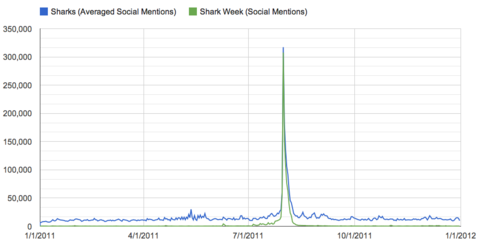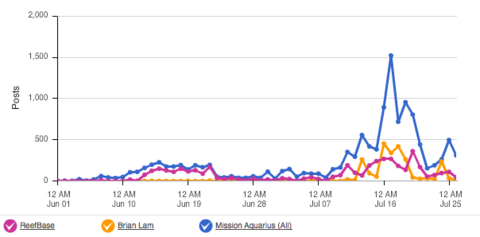Big Listening: Tracking Online Ocean Social Mentions
If you've been reading our Tide Reports or our blog posts, the you've almost certainly seen graphs like this:

And this:

And even some pie charts like this:

These are the results of taking a lot of data from the wonderful world of the Interwebs, feed it into a Machine That Goes Ping AKA Radian6, and watching what it spits out. In fact, we think that the way in which we constantly monitor online social conversations about ocean issues, and then crunch the numbers and distil them into a few lines on a graph or slices in a pie chart, is one of the more important things we do at Upwell. So we thought we'd take a few minutes to explain our 'big listening' methodology.
First, Make Some Tea ...
Each morning as the tea is brewing, we fire up a program called Radian6, which we use to search for all online mentions of a number of different topic profiles. (Think of Radian6 as Google on steroids. A lot of steroids. But without the occasional eruptions of rage.) Radian6 users create their own topic profiles to monitor, and the ones that we have established so far are:
- MPAs
- Overfishing / Sustainable Seafood
- Cetaceans
- Tuna
- Gulf of Mexico
- Ocean Acidification
- Sharks
and a more general catch-all category which we dub, with starling originality,
Ocean
Additionally, we can and do create more narrowly-focused search areas to focus on specific issues or breaking news - for example, the International Coral Reef Symposium, or the International Whaling Commission.
Start Broad ...
Within those topic profiles, we create keyword groups, and for most of the topics we cover, those keywords are relatively straightforward and predictable. When it comes to sharks, however, we have had to be more creative, because a) of all the ocean-themed topics we monitor online, sharks are by some distance the most popular; and b) because the shark 'brand' is spread throughout culture: there are shark-named products, shark-named sports teams, and shark idioms. Radian6 doesn't distinguish between these different uses of the word - unless we ask it to.
So, for example, one of our shark keyword groups asks Radian6 to look for posts that include the words shark or sharks, but to then exclude, for example, San Jose Sharks or 'jumping the shark.'
Or Start Narrow ...
But we also have a separate shark keyword group that takes the opposite tack. It doesn't include the generic terms shark or sharks at all, but includes approximately 125 very specific search items that can only possibly refer to sharks the cartilaginous fishes and nothing else. For example:
- Elasmobranch
- Shark fin soup, Shark finning
- #sharkweek
- megalodon
- hammerhead AND shark
- Great white shark
The idea is that, between them, any collective spikes in social mentions of the specific topics should between them roughly equate to any spikes in the broader shark conversation. In fact, they often don't quite match perfectly, but they are close enough to suggest that our methodologies and keywords are working. So what we then do is average the findings between the two approaches.
Add a comment